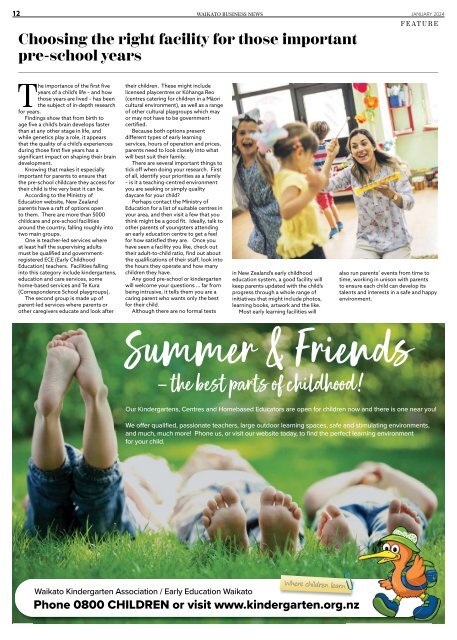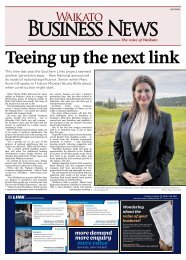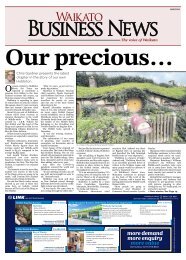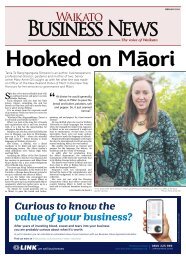Waikato Business News | January 12, 2024
You also want an ePaper? Increase the reach of your titles
YUMPU automatically turns print PDFs into web optimized ePapers that Google loves.
<strong>12</strong> WAIKATO BUSINESS NEWS<br />
JANUARY <strong>2024</strong><br />
Choosing the right facility for those important<br />
pre-school years<br />
FEATURE<br />
The importance of the first five<br />
years of a child’s life – and how<br />
those years are lived – has been<br />
the subject of in-depth research<br />
for years.<br />
Findings show that from birth to<br />
age five a child’s brain develops faster<br />
than at any other stage in life, and<br />
while genetics play a role, it appears<br />
that the quality of a child’s experiences<br />
during those first five years has a<br />
significant impact on shaping their brain<br />
development.<br />
Knowing that makes it especially<br />
important for parents to ensure that<br />
the pre-school childcare they access for<br />
their child is the very best it can be.<br />
According to the Ministry of<br />
Education website, New Zealand<br />
parents have a raft of options open<br />
to them. There are more than 5000<br />
childcare and pre-school facilities<br />
around the country, falling roughly into<br />
two main groups.<br />
One is teacher-led services where<br />
at least half the supervising adults<br />
must be qualified and governmentregistered<br />
ECE (Early Childhood<br />
Education) teachers. Facilities falling<br />
into this category include kindergartens,<br />
education and care services, some<br />
home-based services and Te Kura<br />
(Correspondence School playgroups).<br />
The second group is made up of<br />
parent-led services where parents or<br />
other caregivers educate and look after<br />
their children. These might include<br />
licensed playcentres or Kōhanga Reo<br />
(centres catering for children in a Māori<br />
cultural environment), as well as a range<br />
of other cultural playgroups which may<br />
or may not have to be governmentcertified.<br />
Because both options present<br />
different types of early learning<br />
services, hours of operation and prices,<br />
parents need to look closely into what<br />
will best suit their family.<br />
There are several important things to<br />
tick off when doing your research. First<br />
of all, identify your priorities as a family<br />
– is it a teaching-centred environment<br />
you are seeking or simply quality<br />
daycare for your child?<br />
Perhaps contact the Ministry of<br />
Education for a list of suitable centres in<br />
your area, and then visit a few that you<br />
think might be a good fit. Ideally, talk to<br />
other parents of youngsters attending<br />
an early education centre to get a feel<br />
for how satisfied they are. Once you<br />
have seen a facility you like, check out<br />
their adult-to-child ratio, find out about<br />
the qualifications of their staff, look into<br />
the hours they operate and how many<br />
children they have.<br />
Any good pre-school or kindergarten<br />
will welcome your questions … far from<br />
being intrusive, it tells them you are a<br />
caring parent who wants only the best<br />
for their child.<br />
Although there are no formal tests<br />
in New Zealand’s early childhood<br />
education system, a good facility will<br />
keep parents updated with the child’s<br />
progress through a whole range of<br />
initiatives that might include photos,<br />
learning books, artwork and the like.<br />
Most early learning facilities will<br />
also run parents’ events from time to<br />
time, working in unison with parents<br />
to ensure each child can develop its<br />
talents and interests in a safe and happy<br />
environment.

















